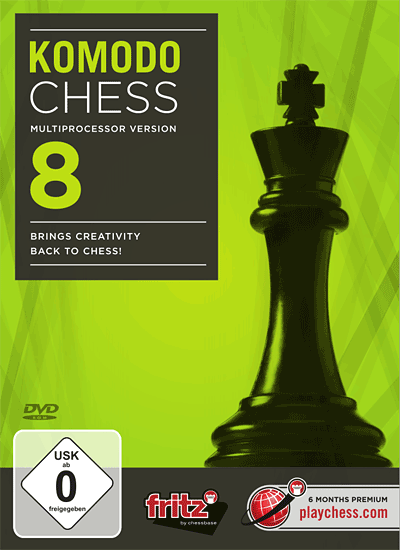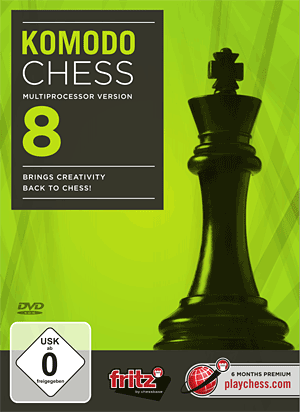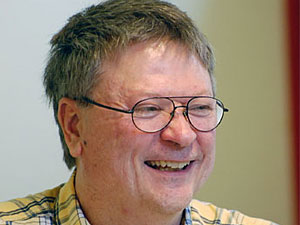Komodo Chess 8 now being delivered

Komodo is a chess program that is different from the rest. Its search makes greater use of extensions than any other top engine, which results in a slightly lower average depth helps the actual playing strength significantly. It also allows Komodo to see deeper than any other engine, even if it is displaying a lower search depth.
The evaluation of Komodo differs from its main rivals because, unlike the automated tuning generally employed, Komodo's evaluation represents a blend of both automated tuning and the judgment of a grandmaster and computer expert (Larry Kaufman). The programming team have avoided terms and weights that don't make sense to him, even if they happen to test a bit positively. Automated evaluations are subject to rather large sample error, and applying some chess judgment appears to be beneficial, both in results and in the reasonableness of reported evaluations.
Komodo is primarily known for superb positional play. Of course it also one of the top few engines in tactical strength as well, but the programmers have not been willing to sacrifice positional play just to score better on tactical problem sets. It is generally recognized that all good engines are far stronger tactically than any human player, but that when positional judgment is involved, top grandmasters are still superior in many positions to any engine. Therefore it makes sense to emphasize positional play rather than tactical skill: it is better to improve one's weakest point rather than just to further improve the strongest feature.
Komodo is especially useful for opening analysis, because as an opening specialist Larry Kaufman has always paid close attention to checking whether the program's evaluations in the opening agree in general with accepted theory. Another point in which Komodo excels is the play and evaluation of positions with material imbalance, which it handles more correctly than other top engines. The endgame of Komodo has been improved by the use of Syzygy Tablebases, which are considered the best for actual play and game analysis as they provide only the most essential information to save time and memory.
Another unique feature in Komodo is its superior handling of multiple processors, using a method that is quite different than the usual one. This is most noticeable when using eight or more cores. There is little doubt that Komodo 8 is and will remain the top rated commercial chess engine on most rating lists.
About the authors
Komodo is a UCI chess engine developed by Don Dailey, Mark Lefler, and supported by chess author and evaluation expert, GM Larry Kaufman. Over the years it has been consistently rated in the top three on most major chess engine rating lists. Currently it is number one.

The original author of Komodo was Don Dailey, who along with GM Larry Kaufman, developed the program. Dailey started chess programming in the 1980s, and was the author and co-author of multiple commercial as well as academic chess programs. He died of an acute form of leukemia in November 2013, but before his death handed over the code and all assets to Mark Lefler.

Mark Lefler is an American computer games and chess programmer. He is author of the computer chess program Now and with Jeff Mallett co-author of the general game playing program Zillions of Games. Mark is a graduate in Engineering Science and Mechanics, and has been employed as a Security Engineering Officer by the US State Department. His non-computer interests include performing magic, music, and gaming.

Lawrence C. ("Larry") Kaufman is a chess grandmaster, a title which he earned after winning the 2008 World Senior Championship. A longtime researcher in computer chess, Kaufman helped write the opening book for the pioneering chess program Mac Hack, co-developed Socrates II, worked on Rybka 3 and on many other research and commercial chess engines.
Larry has written several books and articles, including The Evaluation of Material Imbalances. Larry has reached a considerable level of competence in several other board games. He is one of the strongest shogi players in the West; he learned the game by the traditional method of studying handicap theory and is one of the leading experts in this field. Go and Xiangqi are among his other past interests.
Larry has written several books and articles, including The Evaluation of Material Imbalances. He has reached a considerable level of competence in several other board games. He is one of the strongest shogi players in the West; winning the 1985 and 2013 U.S. Championships; he learned the game by the traditional method of studying handicap theory and is one of the leading experts in this field. Go and Xiangqi are among his other past interests.
His chess tournament victories span nearly half a century, from the American Open Championship in 1966 to the World Open Senior title in 2013. He earned the IM title in 1980, served as chairman of the US Chess Federation committee for most of the 1980s and remains a member of that committee even now. His highest rating was reached at the unusually late age of 50. He has three children, one of whom, Raymond Kaufman, is an International Master. He ran an options trading company called "Chess Options" until retiring from that field in 1986 to become a chess pro, which included software development, teaching, writing, and competing. Although now 66 years old, he remains active in all of these areas of chess. He lives near Washington D.C. Komodo is now the third chess engine he helped develop that achieved the number one rating in the world, the others being MacHack and Rybka 3.
Komodo Chess 8 includes:

- The Komodo 8 engine, which can support up to 64 processor cores and 16 GB of hash memory
- The new Deep Fritz 64-bit program interface (+ 32 bit program interface)
- Online access to the world’s largest analysis database “Let’s Check”, with over 200 million extensively analyzed positions (free access to “Let’s Check” until December 31, 2016)
- Access to ChessBase engine cloud
- Premium membership to Playchess.com for six months
- Database with over 1.5 million games
System requirements
Minimum: Pentium III 1 GHz, 2 GB RAM, Windows Vista, XP (Service Pack 3), 7/8, DirectX9, 256 MB graphics card, DVD-ROM drive, Windows Media Player 9 and Internet access for program activation, access to Playchess.com, Let’s Check and program updates.
Recommended: PC Intel i7 (Quadcore), 4 GB RAM, Windows 8.1, DirectX10, 512 MB graphics card, 100% DirectX10-compatible sound card, Windows Media Player 11, DVD-ROM drive and Internet access for program activation, access to Playchess.com, Let's Check and program updates.
Order Komodo Chess 8 in the ChessBase shop now!




























